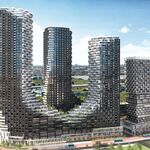junior43
Active Member
This brings back memories as to when I was looking for a home. I didn't actually like much of The Beach because the houses tend to be crammed in together, and lots of them have no private parking. Plus my friends who lived there complained about the constant traffic and lack of street parking in the summer. They eventually moved out of The Beach. The nicest part The Beach that I wanted to buy in wasn't actually part of The Beach. It's Fallingbrook, which is actually in Scarborough. Bigger lots, bigger homes, quieter, and lots of private parking.
Unfortunately, it was also very expensive, more so than most of The Beach. While we could afford parts of Fallingbrook, what we wanted in terms of lot size and home size was a little beyond what we wanted to spend, so we looked west to the Scarborough Bluffs instead, right close to where that article is talking about. Very nice, but adds 10 minutes to my commute compared to Fallingbrook.
I'm glad we got in there before the big rush. That article does validate what I had believed though, that the area was quite undervalued when we bought into it. I'm not so sure it's undervalued now though, if prices are jumping up that fast.
It's true about transit though. Transit in most of the Bluffs is terrible. For us it wasn't an issue though, since we're car dependent anyway. Even when we lived downtown, we were car dependent, since we don't actually work downtown. Ironically, we work in North York.
Yup, totally agree. I had a real estate agent in to see my house in the spring and he explained that the Bluffs is seeing far higher increases in prices relative to the Beaches because people are being priced out of that hood and the Bluffs is a fairly good compromise for people.
A few of my neighbours are actually former Beach residents, they were sick and tired of the lack of parking and the inconvenience it causes, so they moved out here.
As for transit, TTC is sort of horrible in the area, but GO is heaven. I'm 30 minutes door to door for work, but I obviously work near Union making this location more than ideal for me - for now. And the TTC may get better depending on the route they choose for the silly Scarborough subway.




